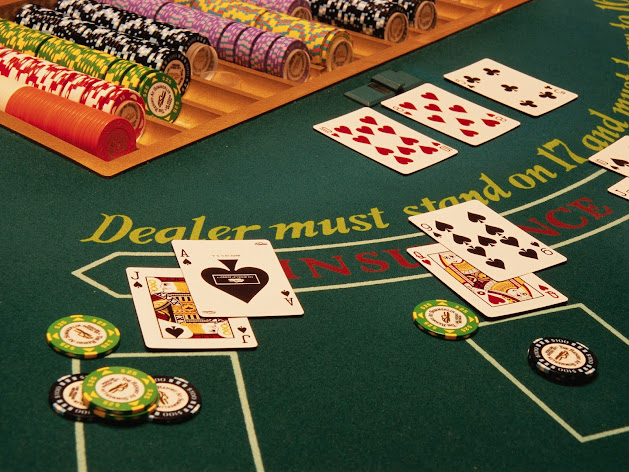Outfoxing THE CASINO AT BLACKJACK
The numerical underpinnings of blackjack are both intriguing and not promptly self-evident. We should ponder somewhat about the gambling club round of blackjack.
A look at the loftiness of a normal club in, say, Las Vegas or Monte Carlo reveals to you that the vast majority lose cash when they bet. There are sound numerical explanations behind a gambling club's triumphant ways. Despite the fact that there are numerous books and sites that indicate to show you how to evade the chances of pretty much every gambling club game, many are misinformed, best case scenario, and trash even from a pessimistic standpoint.
Not at all like in other gambling club games, as a blackjack player you can expand your bet in good circumstances
With regards to the game blackjack, notwithstanding, there are some strong pieces of science that can help a player reverse the situation on the betting foundation. Dissimilar to in other gambling club games, as a blackjack player you can expand your bet in ideal circumstances. You can likewise settle on choices dependent on data you assemble as you play. Both can turn the chances in blackjack in support of yourself.
Initial, a speedy introduction on blackjack, the game is played utilizing at least one 52-card decks. The worth of each card is either the number on the card, or 10 for face cards, or one or 11 for an ace. The objective of the game is to collect cards that complete as near 21 as conceivable without going over. Players get managed two cards and can decide to take more. The gambling club—the vendor—additionally gets two cards, and should stand (quit drawing cards) or draw (demand more cards) in view of a bunch of rules.
Expanding Your Bet in Favorable Situations
Which circumstances are ideal, or not, in blackjack?
Consider getting managed a hand that aggregates 16. In the event that the vendor has a solid hand—say she has a face card appearing—you'll presumably lose in the event that you stand. However, drawing is not really better. Just a 2, 3, 4, or 5 keeps you from going more than 21 and losing right away. Draw, and you'll most likely lose. A hand of 16 is troublesome for you.
What might be said about a hand that sums, say, eight? The greater part of the cards you may draw next are either aces or 10-esteemed, any of which would give you a solid hand. A hand adding up to eight is ideal for you.
So suppose you get managed two 8s. With a worth of 16, this hand is generally horrible. Nonetheless, when you have two cards that are something similar—e.g., two 8s or two jacks—most gambling clubs permit you to part them into two separate hands. In doing as such, you likewise should twofold your bet. What's more, parting the two 8s into two isolated, eight-esteemed hands … goodness! In addition to the fact that you get to transform one awful hand into two great ones, you will build your bet.
The Rules of Blackjack Enable You to Increase Your Wager in Favorable Situations
In most club games, roulette for instance, each different bet has a similar likelihood of winning or losing. Not so in blackjack. On the off chance that, for instance, there are more 10-esteemed cards than little esteemed cards left to be managed, you're bound to get a triumphant hand. By monitoring the number of high-esteemed and the number of low-esteemed cards have been played, you can anticipate the probability of the following hand being a victor. This technique, called "checking cards," is far simpler than you may figure.
Considering can be straightforward as following cards in three classes: those that are positive for you, those that are horrible, and those that don't have a lot of impact on the probability that a hand will either win or lose.
Aces and 10-esteemed cards are good for you since they get you rapidly up to (or near) 21. The more aces and 10-esteemed cards that stay in a deck, yet to be managed, the almost certain it is that you will win the following hand.
Low-esteemed cards—2s, 3s, 4s, 5s, and 6s—are not good for you. Since there are so numerous 10-esteemed cards in the deck, in the event that you get managed a low-esteemed card, the probability is that your other card will carry your all out into the low adolescents. Which implies your next card will take you more than 21 and you'll lose. The more low-esteemed cards that stay in a deck, yet to be managed, the more probable it is that you will lose the following hand. Cards esteemed 7, 8, or 9 don't have as a lot of an impact on winning or losing as low-and high-esteemed cards do.
In the least difficult card-checking framework, aces and 10-esteemed cards are appointed a worth of negative-one, low-esteemed cards are doled out sure one, and 7s, 8s, and 9s are relegated a worth of nothing. The all out for every one of the 52 cards in a deck is zero. So start with a "tally" of nothing and deduct or add one (or zero) as you see cards played. A positive check implies that all the more low-esteemed cards have been managed—the remainder of the deck is in support of yourself! A negative check implies that less aces and 10-esteemed cards stay—not bravo. Expanding and diminishing your wagers as per the check builds the opportunity that you will get back certain rewards from the blackjack table.
The job of arithmetic in the round of blackjack implies system—not karma—and can reverse the situation in support of yourself




Comments
Post a Comment